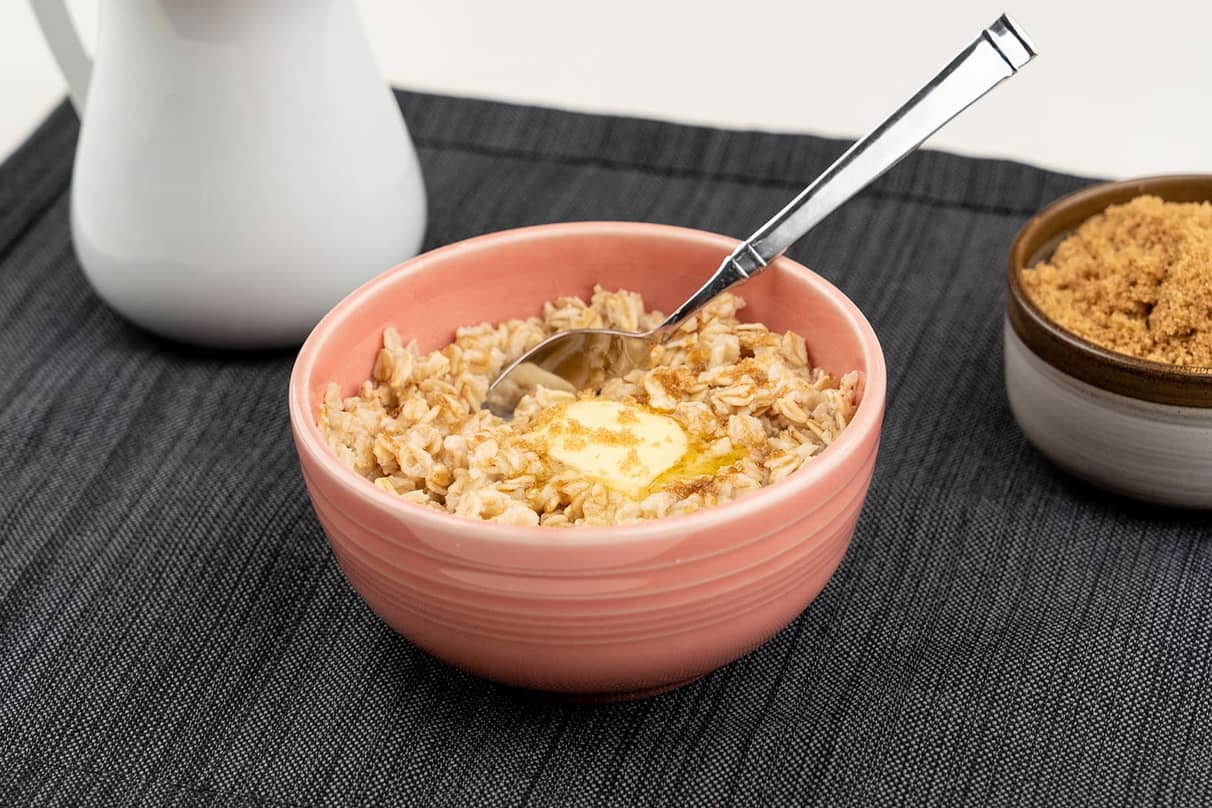4 Health Benefits of Oatmeal, According to Registered Dietitians
Nutrition
This breakfast staple is filled with anti-inflammatory properties and a host of other benefits.

While oatmeal may seem like a basic breakfast food, a bowl of this fibre-rich complex carbohydrate contains an impressive nutritional profile—and provides many health benefits for the body.
According to the US Department of Agriculture, the gluten-free food contains protein, as well as numerous essential vitamins (such as the B vitamin and folate) and minerals including iron, potassium and magnesium.
(Related: What Is an Iron Deficiency and How Do I Know If I Have It?)
Adults who regularly enjoy a bowl of oats may be more likely to follow nutritious eating patterns and lead healthier lives. A study in a 2015 issue of the journal Nutrition Research found that compared to non-oatmeal eaters, oat lovers tend to have a higher diet quality (meaning a higher intake of nutrients), lower body weight and smaller waist circumference—along with being less likely to smoke and more likely to consume less alcohol.
Below, experts identify four health benefits that can come from enjoying a satisfying bowl of cooked coarse oats (or rolled oats, if that's your preference).
4 Potential Health Benefits of Oatmeal
1.May Lower Harmful Cholesterol Levels
There's the good kind of cholesterol, known as high-density lipoprotein, or HDL, and the bad kind known as low-density lipoprotein, or LDL.
"There's a wealth of evidence that suggests oatmeal can help lower blood cholesterol, thanks to the power of beta-glucan—a soluble fibre, largely unique to oats, that helps the liver to pull LDL cholesterol out of the blood", said Katherine Brooking, MS, RD.
She further explained that the fibre binds to some of that LDL cholesterol in the gut and prevents it from entering the bloodstream. And there's plenty of research to back that up.
Take, for example, the findings of one 2013 randomised controlled trial that looked at adults between the ages of 30 and 60 with high cholesterol. Researchers found that those who ate one serving of oatmeal every day for four weeks reduced their LDL by 10 percent and total cholesterol by 5 percent, respectively, compared to those who had rice porridge daily.
Plus, the findings of a 2016 systematic review and meta-analysis suggested that eating oats can lower not only LDL levels, but also other types of harmful lipoproteins that could contribute to high cholesterol levels.
(Related: What Are Empty Calories?)
2.Could Reduce Blood Pressure Levels
Another reason to choose this nutrient-dense breakfast food over other cereals? It could be a major boon for heart health.
"Beta-glucans are known for their ability to help reduce LDL cholesterol, as well as to lower blood pressure, which helps keeps the cardiovascular system healthy and can prevent the development of heart disease", said Erin Palinski-Wade, RD, CDE, LDN, CPT.
Research published in a 2022 issue of the journal Food Chemistry supports that claim. In the paper, it was reported that one preclinical study—and a handful of clinical studies—suggested that oatmeal may help manage and even prevent hypertension thanks to a unique combination of beta-glucans, protein and functional lipids (healthy components in food, such as polyunsaturated fatty acids).
However, a review of 18 randomised controlled trials and three meta-analyses published in the journal Nutrients suggested that, in addition to plant protein and prebiotic fibre content, oats also contain anti-inflammatory properties that can have a direct effect on blood pressure. More specifically, an antioxidant known as avenanthramides are the driving force of these anti-inflammatory properties.
The authors of the review added that oats also provide a dietary source of the neurotransmitter gamma-aminobutyric acid, which has been linked to a decrease in blood pressure and, as a result, could reduce the use of hypertension medications. Of course, any change in medication warrants a conversation with your doctor.
3.May Help Reduce Risk of Cardiovascular Disease
Eating oatmeal may help improve even more risk factors associated with cardiovascular disease.
For instance, a study published in the American Heart Association's journal Stroke followed the dietary habits of Danish men and women ages 50 to 64 for 13 years. The researchers found that those who swapped out eggs and white bread for oatmeal once a week at breakfast had lower rates of stroke than those who didn't make the swap. A lower rate of total haemorrhagic stroke (when a blood vessel that supplies blood to the brain ruptures and bleeds) was also linked to those who ate oatmeal once a week versus eggs and toast.
Another study conducted in Denmark, and published in a 2018 issue of The Journal of Nutrition, demonstrated a link between eating wholegrains and a reduced risk of diabetes. After analysing the eating habits and health records of 55,400 people over the course of 15 years, the study found that those who consumed at least 50 grams of whole grain products each day (including oats) were less likely to develop type-2 diabetes than those who consumed significantly less wholegrains on a daily basis. More specifically, men and women who ate at least 50 grams of wholegrains daily had a 34 percent and 22 percent reduced risk, respectively.
"In addition, the fibre in oatmeal may help lower both blood sugar and insulin levels after meals", Palinski-Wade said. This is important because if blood sugar or insulin levels remain high for long periods of time, it could lead to insulin resistance (a condition where the cells stop responding to insulin), which is a precursor to prediabetes and type-2 diabetes.
After all, the Food and Drug Administration announced more than 25 years ago that it authorised food labels to claim an "association between soluble fibre from whole oats and a reduced risk of coronary heart disease".
4.Supports Gut Health
Of course, the primary benefit of fibrous foods, like oatmeal, is that it facilitates healthy digestion—and keeps you regular—Brooking said.
Oat bran in particular, or the fibre-rich outer layer of the grain that contains beta-glucan, may be a gut-friendly food for those who have been diagnosed with ulcerative colitis.
Researchers gathered 94 patients with ulcerative colitis in remission for a 24-week study. The volunteers were divided into two groups—one group was instructed to eat oat bran while the other was told to consume low-fibre wheat foods. According to their findings, which were published in a 2020 issue of the journal Crohn's & Colitis, the oat bran group showed fewer gastrointestinal symptoms like indigestion, diarrhoea, constipation and abdominal pain than the low-fibre group.
What Are the Healthiest Types of Oatmeal?

No matter if you're looking to add nutrient-dense calories into your diet, achieve weight loss or just shake up your breakfast, there's one type of oatmeal that experts recommend you dip your spoon into.
"The best oatmeal is one with just one ingredient—oats", Palinski-Wade said.
Brooking also recommended plain oatmeal, whether that's made from rolled oats or coarse oats. "Instant, slow-cooked, steel-cut—all are good choices", she said.
In order to reap the benefits of oatmeal, both registered dietitians advised passing on oats that contain added sugar.
"Top with fruit or a teaspoon of sugar to sweeten", Brooking said.
Words by Amy Capetta





